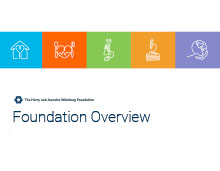When the pandemic hit in March 2020, the sudden shift to virtual work forced most people to hunker down at home — and to recognize the importance of strong and reliable technology in their day-to-day work. The nonprofit sector was no exception. Yet many nonprofits were far from prepared to handle the new normal with their existing information technology (IT) systems.
A report assessing the state of the nonprofit sector in Baltimore, for example, identified the “importance of technology” as a big lesson learned from the pandemic, as technology was crucial in allowing community organizations to stay connected virtually and continue to deliver essential services and programming. That experience also led more than half (58%) of community foundations to plan to moderately or significantly increase their technology budgets.
Seeing this need among grantees and other nonprofit partners, the Weinberg Foundation teamed up with Nonprofit Technology Enterprise Network (NTEN) for a three-year initiative to provide necessary upgrades to help Jewish nonprofits well beyond the pandemic. The nearly 100 participating nonprofits included direct-service agencies with housing, health, or employment-and-training programs, such as Jewish Family Services and Jewish Vocational Service, as well as local Jewish federations and grantees committed to strengthening the Jewish nonprofit sector and combating antisemitism.
“Many Jewish nonprofits didn’t have the tech infrastructure to do their work and meet community needs as effectively as possible,” said Jon Hornstein, who leads the Foundation’s efforts serving the U.S. Jewish community. “Our partnership with NTEN helped these nonprofits not only make much-needed updates but also develop plans for future tech investments so they could prepare to meet the challenges of today and tomorrow.”
The nuts and bolts of the initiative
The initiative began in 2022, with NTEN providing professional development and coaching to 99 Jewish nonprofits across 26 states as part of a six-month program. The first half focused on training on various aspects of technology within the nonprofit sector (e.g., digital health literacy, project planning, and social media). The final three months involved designing a technology project to improve the delivery of basic services, which ranged from ways to bolster case management or telehealth to boosting measurement and evaluation or organizational capacity.
The participating nonprofits then could access funds to implement their strategic IT projects such as hardware updates, client outcomes management systems, and electronic health record systems. NTEN experts provided additional coaching beyond the training period to ensure organizations were able to fully implement their IT projects and achieve their intended results, including strengthening their services.
Over three years, NTEN distributed a total $5 million to support organizations’ IT projects. Three examples of projects:
- Comprehensive Housing Assistance Inc. (CHAI), a Baltimore-based nonprofit and longtime grantee, focused on building an evaluation tool for planning and developing new programs and for evaluating existing programs; purchasing the necessary platforms to streamline activities such as billing; improving data management to reduce manual data entry for staff; and creating an on-site space for effective collaboration during in-person and virtual meetings.
- Jewish Child and Family Services (JCFS) Chicago, which serves low-income and unemployed members of the Jewish community as well as people with disabilities, created a strategic roadmap for IT. This included developing a three-year plan to execute the technology projects and processes required to provide high-quality services in a hybrid environment, such as data migration to upgrade its client services management system.
- Jewish Family and Children’s Service of Greater Philadelphia used funding for permanent technology solutions to ensure high-quality service delivery and a consistent, reliable hybrid work environment. This included updating its internal network infrastructure, providing laptops for staff working at home, upgrading copy machines to make virtual printing more efficient, and purchasing Zoom licenses for all staff members.
Technology makes a difference
Nearly all participating organizations saw immediate value and benefit from the initiative. Ninety-seven percent reported increased practical skills in areas such as security, data management, and project management; 94% indicated that their IT project increased their capacity to manage technology; and 85% said their project improved the quality of services, including better communication with clients, increased client engagement, and enhanced tracking of outcomes.
In addition, staff at the participating nonprofits shared their appreciation for the network of technology-focused professionals and expert coaches they could call on to address challenges and opportunities in their day-to-day work. Beyond strengthening each organization individually, this learning exchange boosted technological capabilities and expertise across the broader network of direct-service organizations, building a stronger Jewish nonprofit sector.
“This program demonstrates the power of investing in building organizational capacity to improve service delivery,” said Anne Allen, the Foundation program officer who helped lead the initiative. “These IT projects had a direct impact on people’s lives, allowing the nonprofits to serve more people, track better outcomes, or simply get more food out to their community — and help advance our shared mission.”




